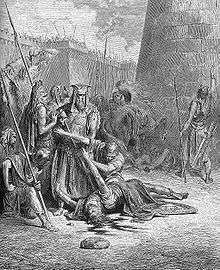Abimelech (Judges)
Abimelech (/əˈbɪməˌlɛk/; אֲבִימֶלֶךְ ’Ǎḇîmeleḵ) was the King of Shechem[1] and a son of Biblical judge Gideon. His name can best be interpreted as "my father is king",[2][3] claiming the inherited right to rule. He is introduced in Judges 8:31 as the son of Gideon and his Shechemite concubine, and the biblical account of his reign is described in chapter nine of the Book of Judges. According to the Bible, he was an unprincipled, ambitious ruler, often engaged in war with his own subjects.
| Abimelech | |
|---|---|
| King of Shechem | |
 Abimelech from Guillaume Rouillé's Promptuarii Iconum Insigniorum | |
| Predecessor | Gideon, only as a Judge |
| Successor | Tola, only as a Judge |
| Born | Shechem, Palestine (region) |
| Died | Thebaz, Palestine (region) |
| Hebrew | אֲבִימֶלֶךְ |
| Father | Gideon |
| שופטים Judges in the Bible |
|---|
| Italics indicate individuals not explicitly described as judges |
| Pentateuch |
| Book of Joshua |
| Book of Judges |
| First Book of Samuel |
Ascension to nobility
The killing of seventy brothers
According to the Book of Judges, Abimelech went to Shechem to meet with his mother's brethren and grandfather and claimed that he should be the only ruler over his mother's brethren and the men of Shechem and not his brothers. He asked them whether they would prefer to be ruled by seventy rulers or just one, and he claimed them as equal brothers. Because Abimelech claimed them his brethren, the men inclined to follow him, and gave him seventy silver shekels from the Temple of Baal Berith. He and the men went to the house of Gideon which is in Ophrah to kill the seventy sons of Gideon, Abimelech's brothers. They were killed on the same stone, but only one had escaped, Jotham.[4]
Abimelech declared king
Since Abimelech was merely a son of Gideon's concubine, he made good of his claim to rule over Manasseh by killing his half-brothers. Jotham was the youngest brother, and he was the only one to have escaped Abimelech's wrath. Abimelech was later declared king by the citizens of Beth-millo and Shechem. When Jotham was informed of this news, he went on top of Mount Gerizim and cursed the people of Shechem and Beth-millo for their declaration, then fled to Beer to hide from Abimelech.[5]
Battles of Shechem
First Battle of Shechem
Gaal and his brothers arrive at Shechem only to plot a coup against Abimelech with the help of the men of Shechem. Before Gaal could begin his plot, Zebul – who is the governor of Shechem and an officer of Abimelech – heard Gaal's plan and was deeply angered. Zebul then sent messengers to inform Abimelech of Gaal's plot. Abimelech planned to ambush Gaal and his followers in front of the city gates through the night towards the morning. He divides his followers by four companies to hide and wait near Shechem. The ambush begins as soon as Gaal stands in front of the gates and fails to respond because of the uncertainty of an actual ambush approaching. Zebul taunts Gaal into fighting Abimelech. Gaal soon fights Abimelech during the battle but fails and is forced to flee with his forces. Zebul chases Gaal out of Shechem while Abimelech proceeded to Arumah.[6]
Second Battle of Shechem

After Gaal was driven away by Zebul, Abimelech gathered three companies by dividing his followers to attack the city. They waited in a field to ambush the people who were moving in and out of the city gates. He attacked as soon as the gates were open for the city dwellers, and two companies were sent from the field to attack the gates. They aggressively rushed towards the gate and passed through them. Besieging the city lasted a day, and Abimelech slaughtered the inhabitants. The remaining resistance went to the tower of El-Berith to hold their ground. Abimelech hastily gathered his followers to Mount Zalmon to explain his plan. He grabbed an ax to cut down the bough of a tree and ordered everyone to follow his example. The boughs were placed and set ablaze around the tower, killing the remaining resistance along with a thousand civilians.[6][7]
Battle of Thebaz and the death of King Abimelech
The biblical account of the Battle of Thebaz begins in the middle of the siege. Already, Abimelech has taken most of the city and comes upon a heavily fortified tower. The civilians head towards the top of a tower while he fights his way through. Abimelech successfully fights most of the way towards the tower, however, a woman struck his head with a stone above. Realizing the wound was mortal, he ordered his armor-bearer to thrust him through with his sword, so nobody would know he was killed by a woman.[8]
Lewis Ginzberg's "The Legends of the Jews" records the following remarks on Abimelech: "Tan B 1 103. The parable of Jotham is said to refer to the prominent judges: Othniel [=Olive tree], Deborah [=fig tree], Gideon [=vine], and Elimelech [=bramble]. Tan. also states that Abimelech reigned for three years, as a reward for the modesty of his father Gideon, who in a "tripartite" sentence refused the royal crown offered him by his people; see Jud. 8.23. Abimelech, in contrast to his father [Jud.8.27], was very greedy for riches, and his end therefore came speedily; Aggadat Bereshit 26, 54., see also ibid., 52-53 where Abimelech wickedness and greed was contrasted with the piety and liberality of his namesake Abimelech, the King of Getar. The ingratitude of the Israelites who permitted Abimelech to murder the children of their benefactor Gideon was counted unto them as though they had forsaken God; ingratitude is as grave a sin as idolatry; Yelammedenu in Yalkut II, 64."[9]
Citations
- Sasson 2014, p. 373.
- Schneider 2000, p. 134.
- Auld 1984, p. 180.
- Auld 1984, pp. 180–83.
- Sasson 2014, pp. 373 & 374.
- Berlin & Brettler 2014, pp. 1127 & 1128.
- Hancock 2013, p. 134.
- Schneider 2000, pp. 147 & 148.
- Szold & Radin 1998, p. 201.
Bibliography
- Auld, A. Graeme (1984). Joshua, Judges, and Ruth. Westminster John Knox Press. ISBN 978-0-66424576-4.CS1 maint: ref=harv (link)
- Berlin, Adele; Brettler, Marc Zvi (2014). The Jewish Study Bible (2nd ed.). Oxford University Press. ISBN 978-0-19939387-9.CS1 maint: ref=harv (link)
- Hancock, Rebecca S. (2013). Esther and the Politics of Negotiation: Public and Private Spaces and the Figure of the Female Royal Counselor. Fortress Press. ISBN 978-1-45146986-8.CS1 maint: ref=harv (link)
- Sasson, Jack M. (2014). Judges 1–12: A New Translation with Introduction and Commentary. Yale University Press. ISBN 978-0-30019033-5.CS1 maint: ref=harv (link)
- Schneider, Tammi J. (2000). Berit Olam: Studies In Hebrew Narrative And Poetry: Judges. Liturgical Press. ISBN 978-0-81465050-9.CS1 maint: ref=harv (link)
- Szold, Henrietta; Radin, Paul (1998). The Legends of the Jews: From Moses to Esther (Reprint ed.). JHU Press. ISBN 9780801858956.CS1 maint: ref=harv (link)
External links
| Wikimedia Commons has media related to Abimelech. |

- Book of Judges article in Jewish Encyclopedia
Abimelech of Manasseh Cadet branch of the Tribe of Manasseh | ||
| Preceded by Gideon |
King of Shechem | Succeeded by Tola |